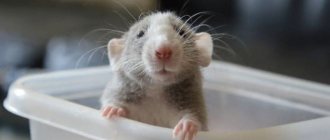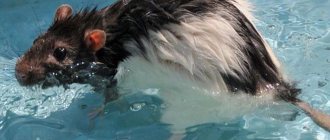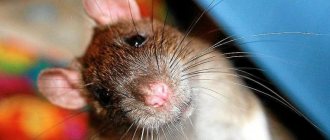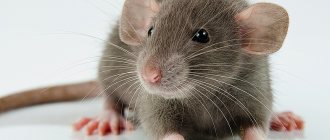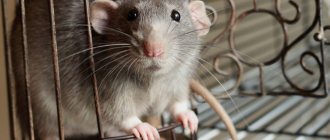Mice live next to the man of the millennium. Many ingenious and dangerous methods have been invented in the fight against “uninvited guests.” But as soon as autumn approaches, you hear the patter of little paws, squeaking, and rustling. They not only create an unpleasant smell in the house, but also chewed things and spoiled food.
Mice live next to the man of the millennium. Many ingenious and dangerous methods have been invented in the fight against “uninvited guests.” But as soon as autumn approaches, you hear the patter of little paws, squeaking, and rustling. They not only create an unpleasant smell in the house, but also chewed things and spoiled food. Of course, you can use poisons and mousetraps, or you should try more humane means, for example, repelling with odors. These are proven, folk methods, thanks to which rodents leave a person’s home and rarely return to it.
What are the dangers of a mouse infestation?
So, let's see what difficulties ordinary house mice can create under the floor:
- Constant noise at night.
- Gnawed cables, wires and pipes made from certain materials.
- Insulation materials turned to dust.
- A specific and not very pleasant “mouse” smell in the house.
- Found mouse waste in the morning wherever possible.
- Danger of contracting rodent-borne diseases.
And also such unpleasant phenomena as a dead mouse under the floor, which is not easy to find and pull out.
Now imagine that in a year a female gives birth to up to 7 mice in each of 10 annual litters. Those. in 12 months there will already be 60-70 new rodents in your house! And each mouse matures within just three months, and also begins to reproduce. At the same time, mice are fast animals: they can reach speeds of up to 12 km/h, jump up to 75 cm in length, and up to 40 cm in height. Just don’t let this problem take its course - they will eat the house too.
Grunt
The rat often makes sounds that are similar to grunting from pleasure when communicating with the owner or receiving a favorite treat from him. However, grunting sounds for these rodents are not the norm, since they most often occur if the animal has rhinitis, pneumonia, heart problems or a deviated nasal septum.
If such a condition appears, it is better to show your pet to a veterinarian and make sure that his life is not in danger.
Important! Grunting sounds combined with shortness of breath, whistling, convulsions, blanching of the ears, blueness of the tip of the tail and paws are produced by dying rats. In this case, the animal needs to be given first aid - give a few drops of Corvalol, and then take it to the doctor.
How can you tell if there are rodents?
So, how can you find out that someone else lives in a house or apartment besides you?
Here are the main signs:
- Smell. Many people don't know him, but he's quite distinctive. Want to become more aware? You can go to a pet store and smell the hamster there. This is the same rodent, its smell is similar to that of a mouse.
- Excrement. They are small round shiny pellets of dense consistency. Over time they harden. There is practically no smell or it is so insignificant that it is imperceptible to the human nose.
- Sounds. If someone is constantly rustling, scratching, or even squeaking somewhere in the apartment, then do not rush to call psychics. These are probably not otherworldly forces at all, but ordinary rodents.
- Nests. If a mouse or rat plans to have offspring, it will build a nest. It usually looks like a bunch of pieces of paper, rags or thread.
- Holes, cracks in the house. If you find a hole in the wall of the pantry, or, for example, the baseboard has come loose from the wall, then this could be a clear sign.
- Gnawed bags, scattered cereals. Mice need something to eat.
How to get rid of mice in an apartment forever?
Doing this quickly is not always possible. Mice and rats are cunning and dexterous rodents, so you need to be patient to deal with them. In addition, the number of one colony sometimes reaches 120-150 individuals - coping with such a number of rodents quickly is quite a difficult task.
You can resort to traditional methods, which we will talk about later, or you can use modern methods - as they say, to your taste.
Ultrasonic repellers
This is something that is not audible to the human ear, but can cause severe anxiety for rodents - to the point that they leave the place where there is this kind of irritant. There is nowhere to hide from it - invisible waves fill the entire space, being a “headache” for mice, disrupting their life cycle and reproduction. For animals, this becomes a significant reason to leave the room to which they will never return - mice have long-term memory and are unlikely to want to live in a place where they were constantly disturbed by ultrasound in the future.
Models of devices are provided for both large rooms and smaller rooms - usually the manufacturer declares efficiency for the maximum area - in reality it can differ by 20%. To completely eliminate rodents, it is necessary for the device to operate continuously for about 7 days.
They can be used to expel rodents from the apartment and to prevent their unwanted appearance. Highlight:
• Ultrasonic;
• Electromagnetic;
• Combined.
Folk remedies
Among the folk methods of control there is gypsum, which is mixed with flour in equal parts and placed in different containers, which are then placed in places where rodents accumulate or near their burrows. It is necessary to leave water for the mice near these containers, since the eaten mixture of flour and alabaster will inevitably make the animals thirsty. Water will cause the plaster to harden, causing the death of the pest. The method has a great advantage over chemical mixtures - it will not cause poisoning by accidentally getting on food, and will not poison pets who may eat the mixture or a poisoned mouse.
Also an effective remedy for mice is ash - more precisely, the alkali it contains, which can cause inflammatory processes on the paws, and then in the mouth of the rodent. Broken glass also has a damaging effect - the main thing is that the fragments are small.
Traps and mousetraps
Mousetraps are a method that has long been popular. However, if there are too many rodents in the room, one such trap may not be enough, so it is better to install several mousetraps in different rooms. For better effectiveness, use pieces of food that emit odors that attract rodents - sausage, bread, lard. Today, electric mousetraps have been developed - the high-voltage discharge of which instantly kills the animal.
Chemical compositions are special substances that are placed along walls and in places where there are large concentrations of mice. Mixed with sugar or grains, it becomes an attractive place where animals find food and, subsequently, death. It is better if the poison changes periodically - this is necessary so that rodents do not develop immunity to the same substances over time. Otherwise, it will lose its effectiveness, and insects will continue to “live and thrive” in your home.
Glue - the essence of its work is to immobilize an animal that falls on cardboard or plywood with a composition applied to it. The glued animal cannot leave, and sometimes several rodents fall into this trap at once. A small drawback of such a fight is the squeaking and “fussing” that the animal can make in an attempt to come unglued and run away.
An example of such a trap is the Medilis glue trap (detailed characteristics and method of use can be found here). This is an effective rodent control product with a non-toxic sticky composition. The trap should be placed in a place where rodents constantly move and left for 1-2 days. In this case, the area of the premises should be taken into account - calculation - 1 trap per 10 sq. m. After a couple of days, the traps must be inspected - they may either have animals attached to them, or be contaminated with dust - in both cases they become unsuitable for further use. It is important that other pets do not fall into such a trap - it is better to temporarily transport the animal. Although the drug has low toxicity, it is important to ensure that it does not get into the eyes - if this happens, be sure to rinse the mucous membranes with plenty of running water.
Professional pest control
Today, the total extermination of rodents in premises can be carried out with the help of special services that use professional means that are most effective in controlling rodents and minimally toxic to humans.
Professional help is sought when other methods have not proven effective, or there is simply no way to deal with the issues of eliminating mice. The method is paid - in different regions the price can reach from 3 thousand for a small room. But most often it justifies itself - deratization is carried out by specially trained people who know exactly where and how to spray the composition. Deratization can be a preventive measure, or it can be a necessary measure. After such treatment, rodents are guaranteed to leave the premises for up to 1 year - only in 2% of cases is repeated treatment required.
The disadvantages of this treatment are high toxicity to other animals, the mandatory use of personal protective equipment, as well as the uncontrolled death of animals, whose corpses can cause strong odors in the treated premises.
Help of essential oils in the fight against rodents
Knowing what smells mice don’t like, you can, if not get rid of them forever, then scare them away for a long time. Many herbs also contain essential oils, but their concentration in dry mixtures is not so high, and therefore the smell is rather weak.
The most effective essential oil with a sharp and persistent aroma that rodents do not like is peppermint oil. Before using it, you need to find holes or holes through which mice enter the house. It is these places that are subject to treatment, which is used in 2 options.
Option 1: Moisten several cotton pads or balls of cotton wool with a mixture of oils. We put the product in the hole and seal it with tape so that the smell does not penetrate into the apartment. The mixture contains: 50 ml. vegetable oil + 20 k. peppermint oil. This composition can be prepared in advance and stored in a tightly closed container.
Option 2: Pour the prepared mixture into a spray bottle, mix thoroughly (shake before use) and spray in the kitchen, along the baseboards, in places that rodents visit most often. The composition consists of 1-15 k essential oil + 300-400 ml. water + 10 ml. alcohol
Note: A one-time treatment will not help; it should be repeated several times. Essential oil will not kill mice, but will only repel them. But if it gets on the pest’s fur, it may die. Then you will find more than just essential oil aromas.
Interesting Facts
It is believed that under normal conditions animals communicate with each other in the ultrasonic range, which is why it is not often possible to hear a mouse squeak.
During sexual games, the male attracts the attention of the opposite sex with special singing, which is also inaccessible to the human ear.
Surprisingly, there are several contradictory folk superstitions about mouse squeaking:
- one of them says that hearing a squeak means the death of the owner of the house;
- another says it's for a wedding,
- and the third even predicts a hungry and miserable winter.
On the line of battle - spices and seasonings
Fighting mice with folk remedies is quite effective and safe. In addition, it brings certain results: if it does not destroy, it certainly repels pests. Among such means, spices and herbs occupy not the least place. They have a strong aroma (no worse than chemical protection), which rodents avoid.
The smell of coriander or cilantro causes the strongest dislike of mice. All you need to do is place cilantro seeds or powder in your kitchen cabinets and mice will stop eating your home food supplies. Sprinkle the powder in those places that furry pests visit most often.
Synthetic flavorings also help a lot in the fight against rodents. They can be bought in specialized stores or ordered online. For us they have a pleasant aroma, but for “furry guests” they do not. Their cost is more expensive than coriander, and the effect is quite strong.
Where do mice come from under the floor?
The main goal of mice is food. The secondary goal is to build nests and reproduce in the house where the food is. And mice can smell food two kilometers away! (Note that the bear is only a little larger - for five). That is why, if you leave your country house or bathhouse closed for the season, remove from there everything that could attract these animals.
Frame houses are especially targeted because of their design. Such a house can be built very quickly, quite inexpensively and at the same time fully meets all the requirements. But mice in its walls and floor are a real problem. An invasion of rodents into such a house can begin at the construction stage, but it is difficult to get rid of such pests.
But even the most durable, serious building made of bricks or blocks also rarely manages to avoid the proximity of tailed animals - after all, they love to settle under the floor. And, if the walls can somehow be protected with metal sheets, then it is more difficult to drive a mouse out from under the floor. And with the arrival of cold weather, this beast will find any opportunity to get underground.
Although the mice themselves are different. Thus, in the warm season, voles make their nests in the open air - under boards, near garbage. Until autumn they actively reproduce, and at the first cold weather they go into any enclosed space. Moreover, they can get under your floor even through the slightly open front door and right in front of the owners! But domestic mice don’t really peek out from under the floor at all. Moreover, cats easily get used to the smell.
Can a rat scream?
A heart-rending squeal, scream, or, as it is also called, “crying” of a rat is a sign that the animal is very scared or in pain.
If there are no objective reasons for panic, and the pet continues to scream, carefully remove it from the cage and feel its body with your finger. As a rule, when a person touches a sore spot, the rodent begins to scream louder.
Note! In some cases, a rat may experience pain due to internal injuries to the esophagus after eating inappropriate foods.
Insulation and rodents: is there a solution?
Let's be clear right away - most modern floor insulation materials really don't eat mice, but at the same time they live quietly in them. And they also build nests in soft ones.
Fun fact: Mice's teeth grow throughout their lives. Moreover, if the mouse does not constantly chew something, then these teeth will grow into its upper jaw. Therefore, gnawing is a daily need for this animal. And the mouse can even sharpen concrete walls.
Oddly enough, mice are especially often found in polystyrene foam. Moreover, they gnaw on it - but not with the goal of getting enough, but with the goal of building comfortable nests in it. And therefore, manufacturers recommend insulating walls and floors with ecowool, which is looser and creates an antiseptic environment. But mice also gnaw on it, although not so willingly.
After all, as practice shows, mice can live under the floor in ecowool, foam plastic, and almost any other insulation. Even in glass wool! However, it is worth noting that it is very difficult, almost impossible, for a mouse to chew through ordinary plywood and OSB boards. All because of the structural features of her teeth. Like slabs that have a layered structure with wood chips directed in different directions.
The secret of the survival of these animals in any conditions is their extreme unpretentiousness. That’s why they gnaw holes for themselves in anything, in a word.
Prevention of mouse infestations
If you have gotten rid of rodents, there is no need to relax. They may visit your home again. Therefore, try to follow a number of simple rules:
- Store products in refrigerators or closed containers out of reach of mice.
- The apartment must be in immaculately clean condition.
- If the house (apartment) is old, then seal all the holes and openings so that “not a single mouse gets through.”
- Place wormwood, mint, or cotton balls soaked in essential oil in the corners.
- Get a mustachioed hunter cat.
Important: If you notice the smell or traces of mice, do not hesitate. You need to take action right away, since the females are very fertile and getting rid of a large mouse family will subsequently be much more difficult.
Sometimes mice cause us sympathy, because they are so cute and fluffy, they have funny habits. There are hobbyists who keep pet mice. But remember that they carry dangerous diseases such as tularemia, leptospirosis, salmonellosis and others. In addition, they need to constantly grind down their incisors, so mice chew on everything: furniture, wires, walls, floors. Their appearance in the house is associated with a lot of troubles. And the methods you just read about will allow you to get rid of “uninvited guests.”
If you find an error or inaccuracy, please select a piece of text and press Ctrl+Enter.
What smells repel mice?
Smells are one of the folk methods of fighting mice, which is also the most natural - plants can be used both fresh and dried. A few sprigs of mint or bay leaf are enough and the rodents will leave the home. A good preventative measure is plantings and mint bushes, which become a hedge for rodents.
They also dislike the odors that come from vinegar essence and ammonia - they are applied to cotton balls and placed in the suspected habitats of pests.
What sounds do house rats make?
In the wild, rats live in packs. To communicate with their relatives, they use the following complementary methods:
- Smells. This type of communication plays a major role in a rat pack, since the sense of smell in these rodents is more developed than other senses. Wild individuals mark their territory with the help of scent glands and recognize their relatives by a special aroma.
- High frequency squeak. Similar sounds are made by male rats during mating games, as well as by babies to search for their mother. Human hearing cannot recognize such a signal.
- Chirping. Rats use this sound to notify their fellows that danger is approaching. Chirping is the rapid tapping of teeth. Pet rats can also make this sound if they are very scared.
Interesting! Rats are myopic from birth, so vision is not very important when they perceive information.
After these rodents were domesticated, people learned to understand the meaning of the sounds they made.
Squeak of decorative mice
Usually, animals express their dissatisfaction with the conditions of detention or report a painful condition with loud exclamations. The mouse can squeak:
- under stress;
- lack of water or food;
- during illness;
- due to itchy skin as a result of infection with ectoparasites;
- with allergic dermatitis, when the skin is flaky, painful and inflamed.
It is believed that a small rodent can squeak for about a week after changing its place of residence - and this is the norm, since it takes some time to adapt to a new home.
It is important to never add new residents to an already established team, otherwise you will end up with a real mouse booth, which will ultimately end not just with indignant exclamations, but also with the murder of the uninvited guest. In the latter case, a desperate whistle will be heard guaranteed.
Illness is another reason for squeaking. At the same time, it will be more like crying - loud, pitiful and prolonged, only intensifying over time. If you suspect health problems, you should carefully examine the mouse to see if it has any damage, or show it to a veterinarian. True, finding a good ratologist (rodent specialist) can be problematic, especially in small provincial towns.
By the way, in some cases, disturbances stop when the type of bedding is changed or the nest where the small gray cub lives is thoroughly cleaned.
Often, owners mistake chest whistling or wheezing due to breathing problems as a result of a cold or pneumonia for a squeak. If pneumonia or bronchitis is suspected, the animal is transplanted into a separate container (quarantine) so that the rodent does not become a source of infection for other pets, and the dynamics of the process are carefully monitored. If the condition worsens, antibiotics and vitamins may be required.
Cough and sneeze
Cold symptoms in rodents and humans are very similar. The disease is manifested by coughing, sneezing, lacrimation, runny nose and apathy. When the first signs of respiratory diseases appear, your tailed pet should be shown to a veterinarian, since such diseases in rats develop very quickly and often cause death.
Sometimes healthy animals make sounds that vaguely resemble sneezing or coughing. They usually do this to intimidate their cagemates and to assume a leadership role.
